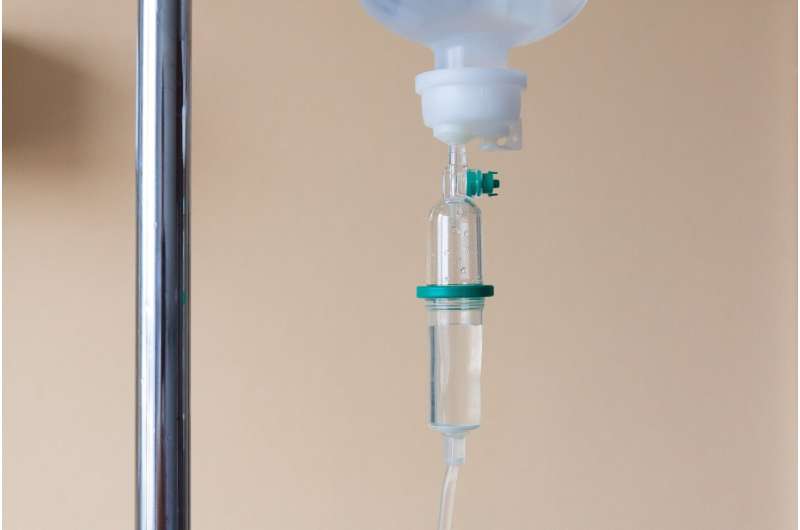This article has been reviewed according to Science X's editorial process and policies. Editors have highlighted the following attributes while ensuring the content's credibility:
fact-checked
peer-reviewed publication
trusted source
proofread
A simple change to save thousands of patients with sepsis

Changing the way antibiotics are given to adult patients with sepsis will save thousands of lives a year globally, according to research by The University of Queensland and The George Institute for Global Health.
A clinical trial and systematic review have shown that intravenously administering commonly used penicillin-like antibiotics via continuous infusion—instead of multiple short infusions—cures infections and saves lives.
The research was published in two papers (here and here) in JAMA.
Professor Jason Roberts, Director of UQ's Centre for Clinical Research (UQCCR) and Metro North Health's Herston Infectious Diseases Institute, said the clinical trial of more than 7,000 patients tested findings from laboratory studies to deliver the best drug concentration for the bacteria causing the infection.
"We found by delivering these antibiotic doses as a continuous infusion we can maintain the concentration of the antibiotic in a patient's blood and tissue, and kill bacteria at a greater rate," Professor Roberts said.
"This simple intervention uses commonly available antibiotics, so even small hospitals in third-world countries can implement the dosing change almost as easily as well-resourced hospitals in developed countries."
Associate Professor Joel Dulhunty, UQ researcher and Director of Research and Implementation at the Royal Brisbane and Women's Hospital, said the international trial BLING (Beta-Lactam Infusion Group) III was one of the largest ever antibiotic randomized clinical trials.
"The trial [...] was a massive undertaking involving 104 hospitals in 7 countries, more than 130,000 doses of medication and the analysis of 4 million data points," Dr. Dulhunty said.
Associate Professor Naomi Hammond, Critical Care Program Head at The George Institute, said the clinical trial data was then used in a systematic review and meta-analysis, combining 18 studies and more than 9,000 patients.
"The combined data showed a very significant benefit with the use of a continuous infusion, saving one life for every 26 patients treated," Dr. Hammond said.
UQCCR Emeritus Professor Jeffrey Lipman said the next step for the research team would be to inform worldwide treatment protocols and guidelines.
"Physicians follow international guidelines when treating sepsis patients, and at the moment these guidelines have a very low certainty of evidence around how to best administer these drugs," Emeritus Professor Lipman said. "Thanks to our program of research, treatment protocols and guidelines will now have a very high certainty. Given the simple nature of the findings and the conversations we are having between hospitals, we expect most will adopt these changes immediately."
The research is the culmination of a program of work over 20 years led by Emeritus Professor Lipman that began with small studies focusing on dosing, to large clinical trials with multinational collaborators.
The BLING III trial involved collaborators from Australia, New Zealand, Malaysia, Sweden, Belgium, France and the UK.
More information: Mohd H. Abdul-Aziz et al, Prolonged vs Intermittent Infusions of β-Lactam Antibiotics in Adults With Sepsis or Septic Shock, JAMA (2024). DOI: 10.1001/jama.2024.9803
Joel M. Dulhunty et al, Continuous vs Intermittent β-Lactam Antibiotic Infusions in Critically Ill Patients With Sepsis, JAMA (2024). DOI: 10.1001/jama.2024.9779




















